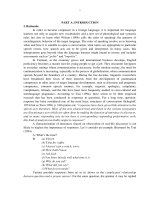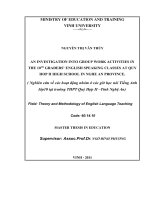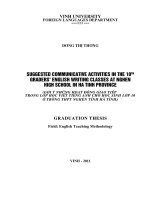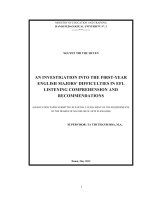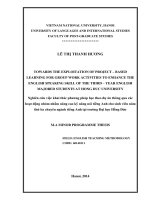An investigation of some difficulties in the listening of english majored freshmen at thu dau mot university
Bạn đang xem bản rút gọn của tài liệu. Xem và tải ngay bản đầy đủ của tài liệu tại đây (928.41 KB, 39 trang )
THU DAU MOT UNIVERSITY
FACULTY OF FOREIGN LANGUAGES
-------------------
GRADUATE PAPER
Title: AN INVESTIGATION OF SOME DIFFICULTIES
IN THE LISTENING OF ENGLISH - MAJORED FRESHMEN
AT THU DAU MOT UNIVERSITY.
LECTURER: NGUYEN HOANG MINH DUC
STUDENT: CAO THANH THAO
STUDENT CODE: 1722202010325
CLASS: D17AVKD04
MAJOR: ENGLISH LANGUAGE
COURSE: 2017-2021
Thu Dau Mot, december 15th, 2020
i
THU DAU MOT UNIVERSITY
FACULTY OF FOREIGN LANGUAGES
-------------------
GRADUATE PAPER
Title: AN INVESTIGATION OF SOME DIFFICULTIES
IN THE LISTENING OF ENGLISH - MAJORED FRESHMEN
AT THU DAU MOT UNIVERSITY
LECTURER: NGUYEN HOANG MINH DUC
STUDENT: CAO THANH THAO
STUDENT CODE: 1722202010325
CLASS: D17AVKD04
MAJOR: ENGLISH LANGUAGE
COURSE: 2017-2021
Thu Dau Mot, december 15th, 2020
ii
STATEMENT OF AUTHORSHIP
Student full name
Cao Thanh Thao
Student ID
1722202010325
Title of paper
AN INVESTIGATION OF SOME DIFFICULTIES IN
THE LISTENING OF ENGLISH - MAJORED FRESHMEN AT THU
DAU MOT UNIVERSITY
I hereby confirm that I am the sole author of the paper presented. Where
the work of others has been consulted, this is duly acknowledged in the
paper’s bibliography. I have also not consulted any other unnamed
online sources. All verbatim or referential use of the sources named in
the bibliography has been specifically indicated in the text.
Binh Duong, October 2020
Signature
iii
ACKNOWLEDGMENTS
Taking this opportunity, I would also like to thank the Foreign Language
Department teachers, Thu Dau Mot University, who gave me the necessary
knowledge to complete this lesson. Thanks to all the authors of the books,
tapes, and other materials listed in the references. Their ideas reflected and
researched. You in the class because of your comments, many members of the
study results.During the time of this graduation report, I have received many
valuable suggestions, and encouragement and help from seeing her, her
family and friends.
First of all, I would like to express my profound thanks to ancient
Nguyen Hoang Minh Duc, teacher of English in the Foreign Language
Department, who always gave her advice and advice to complete this talent.
I also want to send my most sincere thanks to the ladies in the Foreign
Language Department, Thu Dau Mot University, who have taught you the
basics to complete this lesson.
First-year students (D20) foreign language department wholeheartedly
participated in the survey.
Finally, I would like to send a special thank you to my mother for their
encouragement and support that played a significant role in my graduation
paper.
iv
ABSTRACT
Listening skill is one of the essential skills for communicating in real
life. In learning a foreign language, this skill is even more important to
remember. Everyone knows that hearing a message is not as simple as hearing
it, so the listener must understand the message and respond appropriately. The
thesis will study the students' subjective and objective difficulties in learning
listening skills. Therefore, I have applied quantitative methods to do the
research. So the collecting data instruments like questionnaires were used to
do the study. The results of the investigation will show the difficulties that
students face when learning listening skills. More importantly, research helps
me find the cause of those difficulties so that students can realize what
obstacles they encountered when listening and can promptly overcome them.
With the hope of improving the students' listening ability at TDMU, I have
tried to do this thesis with my own experience and knowledge of English.
v
LIST OF ABBREVIATIONS
Acronyms
Full word
TDMU
Thu Dau Mot University.
FFL
Faculty of Foreign Language.
vi
LIST OF CHARTS
Chart 1 The age .............................................................................................. 17
Chart 2 The period is learning English .......................................................... 18
Chart 3 The ability ......................................................................................... 18
Chart 4 The frequency of practicing listening skills at home ........................ 19
Chart 5 The factors are affecting .................................................................... 20
Chart 6 The importance of English listening skill ......................................... 21
Chart 7 The frequency of getting difficulties in listening skill ...................... 21
Chart 8 The difficulty in listening skill .......................................................... 22
Chart 9 The causes of getting difficulties in listening skill ........................... 23
Chart 10 The difficulties of listening ............................................................. 24
vii
TABLE OF CONTENT
STATEMENT OF AUTHORSHIP ................................................................... i
ACKNOWLEDGMENTS................................................................................ iv
ABSTRACT ...................................................................................................... v
LIST OF ABBREVIATIONS .......................................................................... vi
LIST OF CHARTS ......................................................................................... vii
TABLE OF CONTENT ................................................................................. viii
CHAPTER 1 INTRODUCTION ..................................................................... 1
1.1
THE RATIONALE OF THE STUDY .................................................... 1
1.2
THE AIMS OF THE STUDY ................................................................. 2
1.3
THE RESEARCH OF THE STUDY ...................................................... 2
1.4
THE ORGANIZATION OF THE STUDY ............................................. 2
CHAPTER 2 OVERVIEW OF PREVIOUS WORK ....................................... 3
CHAPTER 3 LITERATURE REVIEW ......................................................... 5
3.1
OVERVIEW OF LISTENING ................................................................ 5
3.1.1
Definition of listening........................................................................... 5
3.1.2
The importance of listening skill .......................................................... 6
3.1.3
Types of listening ................................................................................. 7
3.1.3.1 Discriminative Listening ...................................................................... 7
3.1.3.2 Comprehensive Listening ..................................................................... 8
3.1.3.3 Specific Listening Types ...................................................................... 8
3.2
THE DIFFICULTIES IN LEARNING THE LISTENING SKILL ...... 10
3.2.1
What problems do students have with listening? ............................... 10
3.2.2
The reasons make students difficult to learn listening English .......... 12
3.3
THE FACTORS THAT AFFECT ENGLISH LISTENING ................. 14
3.3.1
The classroom atmosphere ................................................................. 14
3.3.2
Students’ motivation ........................................................................... 14
3.3.3
Quality of recorded material ............................................................... 14
viii
CHAPTER 4 METHODOLOGY ................................................................... 15
4.1
THE RESEARCH DESIGN .................................................................. 15
4.2
THE PARTICIPANTS .......................................................................... 15
4.3
THE DATA COLLECTION INSTRUMENT ...................................... 15
CHAPTER 5 PRESENTATION, ANALYSIS, AND DISCUSSION OF THE
DATA .............................................................................................................. 17
CHAPTER 6 CONCLUSION ......................................................................... 26
6.1
RECOMMENDATION ......................................................................... 26
6.2
CONCLUSION...................................................................................... 26
REFERENCES ................................................................................................ 28
APPENDIX ..................................................................................................... 29
ix
CHAPTER 1
INTRODUCTION
1.1
THE RATIONALE OF THE STUDY
In today's era, the booming age of science, technology, and information,
it is indispensable to grasp English to communicate with other countries
worldwide because English is extremely popular worldwide. The main goal of
teaching and learning foreign languages was reading comprehension to serve
literary, scientific, and technical research. Today, to administer the open
policy of innovation, integration with the region and the world, the goal of
foreign language teaching is communication. Teachers must change education
according to the verbal communication method (listening - speaking).
Listening is one of the four critical skills of learning a foreign language. We
cannot communicate without hearing. To be successful in conversation, you
must listen to and understand what other people say. When we speak English,
we have time to think about what to say and how to use words. When
listening, we must pay attention to listening and understanding. Learning to
hear is the weakest of the four skills. The teaching of listening skills is
sometimes not respected and methodical due to several reasons such as lack
of facilities in the schools, or at the end of the term, at the end of the year,
there is no listening test, etc.
As a researcher, I would like to introduce to you the name "Investigating
some difficulties in hearing English of first-year students majoring in Thu
Dau Mot University" due to the above reasons. Having spent a long time
studying English at Thu Dau Mot University (TDMU), for more than three
years, I feel that the first-year students majoring in English are still confused
and difficult to hear. To find out the difficulties that students often encounter
when practicing listening, I decided to choose the topic titled "An
investigation of some difficulties in the listening of English-majored
freshmen at Thu Dau Mot University."
1
1.2
THE AIMS OF THE STUDY
The research is carried out with the following purposes:
Firstly, the research was conducted to survey the current English
listening practice situation in TDMU to find out the cause of those
difficulties.
Secondly, analyze the situation of first-year students having difficulty
Difficulty in English listening skills at TDMU.
Lastly, the research shows that most students find it challenging to learn
listening skills, so I want to find out the common difficulties students often
encounter when learning English listening skills at TDMU. In addition to
these suggestions, we also want to help students catch up with an average
conversation speed to improve their communication skills, especially their
listening skills.
1.3
THE RESEARCH OF THE STUDY
1. What are the real situations of learning English listening skills for the
first-year student in the Faculty of Foreign Language (FFL) at TDMU?
2. What are the difficulties for the first-year student in FFL at TDMU?
3. Why is listening so difficult?
1.4
THE ORGANIZATION OF THE STUDY
The study includes five main chapters, organize as follows:
Chapter 1: Introduction
Chapter 2: Overview of previous work
Chapter 3: Literature review
Chapter 4: Methodology
Chapter 5: Presentation, analysis, and discussion of the data
Chapter 6: Conclusion
2
CHAPTER 2
OVERVIEW OF PREVIOUS WORK
Today we have to recognize that English is now one of the most popular
languages globally and widely used in almost every country, including
Vietnam. English is more popular, along with the steady development of the
economy in Vietnam. No matter what kind of job you do or any profession,
language appears. Among English skills, listening is considered an essential
skill. Skills in Listening - Speaking - Reading - Writing, Listening, and
Speaking is used mainly in everyday life to perform activities such as going to
school, going to work, socializing, in business, etc. However, not everyone
has good listening skills. Because in fact, listening is one of the most
demanding and challenging skills in language, voice, sound, and arrangement
of audible information so that it can grasp the speaker's main idea and content
when listening. It is more important that this skill needs to be improved, so
every person who wants to strengthen listening must always be focused and
extremely persistent during the listening process, even those frequently in
contact with foreigners. Recognizing the importance of English, several
studies have improved students' hearing at schools or to employees at
companies wishing to use the language.
The first study is the project “KHẢO SÁT NHỮNG KHĨ KHĂN
TRONG Q TRÌNH DẠY KỸ NĂNG NGHE HIỂU CHO SINH VIÊN
HỌC TIẾNG ANH KHÔNG CHUYÊN NGỮ" potx,” by Ton Nu Xuan
Phuong at the University of Foreign Languages, University of Danang
conducts teaching. Language in general, in teaching and learning listening
comprehension skills in particular, must be the result of comprehensive
efforts from teachers and learners and related factors such as teaching
materials, teaching methods, assessment methods, etc. Finally, and most
importantly, this study explains the difficulties faced by teachers and learners
in non-language classes in the teaching and learning process. Listening skills
from which to propose several ideas to improve the situation. (Ton Nu Xuan
Phuong & Báo cáo nghiên cứu khoa học: "KHẢO SÁT NHỮNG KHĨ KHĂN
TRONG Q TRÌNH DẠY KỸ NĂNG NGHE HIỂU CHO SINH VIÊN HỌC
TIẾNG ANH KHÔNG CHUYÊN NGỮ" potx).
3
The second study is the study "Những khó khăn và giải pháp trong việc
học kỹ năng nghe tiếng Anh ở nhà của sinh viên năm 2, chuyên ngành tiếng
Anh Sư phạm ở trường CĐSP Lạng Sơn" by Nguyen Thi Ngoc Anh. It has
been clear that to learn to listen effectively; the optimal method is to increase
study time and maintain study time regularly and scientifically. Therefore,
supporting students to use Internet-connected computer labs or labs during
self-study hours is also a good thing to do to facilitate students in difficult
circumstances—practice listening skills for yourself. (Nguyen Thi Ngoc Anh
& Những khó khăn và giải pháp trong việc học kỹ năng nghe tiếng Anh ở nhà
của sinh viên năm 2, chuyên ngành tiếng Anh Sư phạm ở trường CĐSP Lạng
Sơn, 24/05/2016).
However, I could not find any specific study on the difficulties students
often face in listening to English students sitting in school.
4
CHAPTER 3
LITERATURE REVIEW
3.1
3.1.1
OVERVIEW OF LISTENING
Definition of listening
Listening is considered an essential skill in acquiring both a native
language and a second or foreign language. It paid more attention. So far,
there have been several different definitions of hearing, such as:
Richard Nordquist (Updated January 06, 2019), Listening is the active
process of receiving and responding to spoken (and sometimes unspoken)
messages. It is one of the subjects studied in language arts and the discipline
of conversation analysis. Listening is not just hearing what the other party in
the conversation has to say. "Listening means taking a vigorous, human
interest in what is being told us," said poet Alice Duer Miller. "You can listen
like a blank wall or like a splendid auditorium where every sound comes back
fuller and richer." (Richard Nordquist & The Definition of Listening and How
to Do it, 06/01/2019)
Listening is the act of hearing attentively. Research shows that 45% of
our time spent on listening. We listen more than speak. If this listening skill is
appropriately used, we can master the tools of communicative skills.
Listening is difficult, as the human mind tends to distract easily. A person
who controls his mind and listens attentively acquires various other skills and
benefited. Listening skills can be defined as, "Listening is the act of hearing
attentively." It is also a process similar to reading, which should possess
phonology, syntax, semantics, and text understanding. Thomlison (1984)
defines listening as "Active listening, which is very important for effective
communication." Listening can also be described as "More than just hearing
and to understand and interpret the meaning of a conversation.". Listening
skill makes you successful in the workplace, family, and society. Good
listening skill is mandatory to get into a profession in communications,
management, planning, sales, etc. Listening skills involve a different set of
etiquettes, questioning for an explanation, showing empathy, and providing a
suitable response. Good listening skills include understanding ability. Body
language is also a part of listening skills. Eye contact with the speaker, sitting
5
straight, and alert are good listeners' beautiful gestures. (Rezinna Sebongbong
& Definition of Listening Skills, 13/2/2014).
To sum up, all of the definitions are given to clarify the nature of the
listening skill, which is necessary to acquire a native language or a foreign
one.
3.1.2
The importance of listening skill
Listening is also one of the essential life skills defined as "skills that help
you have a better view of life, skills that help you maintain a higher sense of
yourself and the world around you." It is one of the most important ways
people feel life. People in real life often hear more than talk. We listen
everywhere, all the time, and listen to everything. For example, at home, we
watch the news, watch movies or chat with others. At school, students listen
to the teachers teach. At a meeting, employees listen to new plans from the
director, etc. Without listening, people become obsolete every minute of their
lives. People might funnily miss important information or answer, so listening
skills are essential in real life.
We were building better relationships through active listening. When we
are communicating with someone, we are actively forming, in our minds,
what we are going to say next after the other person stops talking, which takes
our attention off the other person, and we tend to miss what they are saying.
Listening involves more than just hearing. It also consists of responding to
what someone is saying. This process is called active listening. Michigan
State University Extension suggests that active listening can help you talk
with others more clearly and understand. It isn’t always easy, but when you
can learn to practice it often, it can help you build a better relationship with a
partner, a child, a friend, or a co-worker.
Strategies for active listening include the following:
Focus your full attention on the other person talking. Face them and
maintain eye contact, and be sure you are at the same level. If they are
standing – you should stand; if they are sitting – you should sit.
Ask good questions. Don’t accuse or blame in your questioning. Try to
look for hidden meaning. Ask open-ended questions and make sure your tone
of voice is sincere. For example, “What do you think we should do about the
situation? What do you feel are the options?”
6
Sometimes it helps to repeat back to the other person what they just said
but in your own words. That way, you are checking to see if you have heard
them correctly, which can provide more information, and the other person has
a chance to correct any misunderstandings. It also shows that you are
interested in what they are saying.
Active listening takes time and practice. However, every time you use
active listening, it gets a little easier. It can help you to navigate through
difficult conversations. More than that, it helps improve overall
communication, builds a better understanding, and ultimately leads to better
relationships with family, friends, and co-workers. (Holly Tiret & Michigan
State University Extension, 23/11/2015)
3.1.3
Types of listening
In general, there are two main types of listening:
3.1.3.1 Discriminative Listening
Discriminative listening is first developed at a very early age – perhaps
Discriminative listening is first developed at a very early age – perhaps even
before birth, in the womb. This form of listening is the most basic and does
not involve understanding the meaning of words or phrases, but merely
different sounds made. For example, in childhood, people distinguish between
the sound of the parent's voice - the voice of the father sounds different from
the voice of the mother.
Discriminative listening develops through childhood and into adulthood.
As we grow older and develop and gain more life experience, our ability to
distinguish between different sounds is improved. Not only can we recognize
other voices, but we also develop the ability to recognize subtle differences in
how sounds are made – this is fundamental to ultimately understanding what
these sounds mean. Differences include many subtleties, identifying foreign
languages, distinguishing between regional accents, and clues to the speaker's
emotions and feelings.
Being able to distinguish the subtleties of sound made by somebody who
is happy or sad, angry or stressed, for example, ultimately adds value to what
is said and, of course, does aid comprehension. When discriminative listening
skills are combined with visual stimuli, the resulting ability to ‘listen’ to
body-language enables us to understand the speaker more fully – for example
7
recognizing somebody is sad despite what they are saying or how they are
saying it.
3.1.3.2 Comprehensive Listening
Comprehensive listening involves understanding the message or
messages that are being communicated. Like discriminative listening,
extensive listening is fundamental to all listening sub-types.
To use comprehensive listening and therefore gain understanding, the
listener first needs appropriate vocabulary and language skills. Using overly
complicated language or technical jargon, therefore, can be a barrier to
comprehensive listening. Comprehensive listening is further complicated
because two different people listening to the same thing may understand the
message in two different ways.
Comprehensive listening is complimented by non-verbal communication
sub-messages, such as the tone of voice, gestures, and other body languages.
These non-verbal signals can greatly aid communication and comprehension
but can also confuse and potentially lead to misunderstanding. In many
listening situations, it is vital to seek clarification and use reflection to help to
understand.
3.1.3.3 Specific Listening Types
Discriminative and comprehensive listening are prerequisites for specific
listening types. Listening types can be defined by the goal of the listening.
The three main types of listening most common in interpersonal
communication are: Informational Listening (Listening to Learn); Critical
Listening (Listening to Evaluate and Analyse); Therapeutic or Empathetic
Listening (Listening to Understand Feeling and Emotion)
In reality, you may have more than one goal for listening at any given
time – for example, you may be listening to learn while also attempting to be
empathetic.
Informational Listening
Whenever you listen to learn something, you are engaged in
informational listening, which is right in many everyday situations, education,
and workplaces. When you hear the news, watch documentaries, when a
8
friend tells you a recipe, or when you're talking about a technical problem
with a computer - there are many other examples of listening to information.
Although all types of listening are ‘active’ – they require concentration
and a conscious effort to understand. Informational listening is less active
than many of the other kinds of listening. When we’re listening to learn or be
instructed, we take in new information and facts; we are not criticizing or
analyzing. Informational listening, especially in formal settings like in work
meetings or while in education, is often accompanied by note-taking – a way
of critical recording information to be reviewed later. (See Note-Taking for
more details).
Critical Listening
We can be said to be engaged in critical listening when evaluating or
scrutinizing what is being said. Essential listening is a much more dynamic
behavior than informational listening and usually involves problem-solving or
decision making. Critical listening is akin to critical reading; both include
analyzing the information being received and alignment with what we already
know or believe. Whereas informational listening may be mostly concerned
with receiving facts and new information - critical listening is about analyzing
opinion and making a judgment.
When the word ‘critical’ is used to describe listening, reading, or
thinking, it does not necessarily mean that you are claiming that the
information you are listening to is somehow faulty or flawed. Instead,
listening means engaging in what you hear by asking yourself questions like
‘what is the speaker trying to say?’ Or ‘What is the main argument being
presented?’, ‘How different is what I’m hearing?. Critical listening is,
therefore, fundamental to authentic learning. (Also see our page: Critical
Reading).
Many day-to-day decisions that we make are based on some form of
‘critical’ analysis, whether it be critical listening, reading, or thought. Our
opinions, values, and beliefs are based on our ability to process information
and formulate our feelings about the world around us and weigh up the pros
and cons to make an informed decision.
It is often essential when listening critically to have an open mind and
not be biased by stereotypes or preconceived ideas. By doing this, you will
9
become a better listener and broaden your knowledge and perception of other
people and your relationships.
Therapeutic or Empathic Listening
Empathic listening involves attempting to understand the speaker's
feelings and emotions – to put yourself into the speaker's shoes and share their
thoughts. (See our page: What is Empathy? for more information).
Empathy is a way of deeply connecting with another person, and
therapeutic or empathic listening can be particularly challenging. Compassion
is not the same as sympathy; it involves more than being compassionate or
feeling sorry for somebody else – it involves a more profound connection – a
realization and understanding of another person’s point of view.
Counselors, therapists, and other professionals use therapeutic or
empathic listening to understand and ultimately help their clients. This type
of listening does not involve making judgments or offering advice but gently
encouraging them to explain and elaborate on their feelings and emotions.
Skills such as clarification and reflection are often used to help avoid
misunderstandings. (See our different pages: Counselling?, Clarification, and
Reflection for more information on these topics).
We are all capable of empathic listening and may practice it with friends,
family, and colleagues. Showing empathy is a desirable trait in many
interpersonal relationships – you may well feel more comfortable talking
about your feelings and emotions with a particular person. They are likely to
be better at listening empathetically to you than others; this is often based on
similar perspectives, experiences, beliefs, and values – a good friend, your
spouse, a parent, or sibling, for example. (SKILLSYOUNEED & Types of
Listening).
3.2
3.2.1
THE DIFFICULTIES IN LEARNING THE LISTENING SKILL
What problems do students have with listening?
Here are the difficulties when learning English listening that you often
encounter.
Do not recognize English sounds
When asked about the cause of the difficulty with English sounds, some
people think that this difficulty is due to their inability to distinguish sounds,
10
English homophones, especially words with pronunciation. The sound is
almost the same. In particular, the failure to recognize the primary
information that needs to hear is due to some characteristics in the speaker's
pronunciation connecting the two sounds, so it will be confusing when
listening to sentences with too many words.
Lack of concentration when listening
The lack of concentration when listening may be that there is not much
listening experience that makes it difficult for the listener to concentrate and
makes you unable to grasp the main idea of the conversation. Besides, there is
also the reason that listeners do not know what essential information to listen
to, leading to incorrect information capture, or listeners cannot deduce the
main content, making them unable to grasp is the Main idea when listening.
Not keeping up with the speed of the speaker
During the listening process, many people cannot keep up with the
speaker's speed because their brains always translate what they hear into
Vietnamese before understanding the content. However, you did not know
that; then your brain will have to work at the same time three things: listening,
translating what you hear from English, and memorizing information.
Therefore, you may have received and learned this information when you
have heard and understood a sentence. Still, the speaker continues to say the
second and the third sentence, which leads to you not understanding what
they are saying because the brain has not loaded all the information. Besides,
we know that foreigners also attach tail sounds, so if you do not listen to
English often, it will lead to unfamiliar hearing and consequently not keep up
with the speaker's speed and missing a lot of information.
Limit vocabulary to use in everyday life
You may have taken the time to learn a lot of vocabulary that you can
use in everyday communication, but when you hear foreigners speak, you
seem "dumb," wondering "what are they saying? ". Sometimes you may
mistakenly think that you know many words, but they are just essential and
straightforward communication words. However, check that these words are
prevalent in everyday life. Maybe you learned the vocabulary in travel,
economics, apparel, etc. But it can see that the language used in your daily
life is still limited because, in everyday communication, you cannot receive
11
all the information from the speaker. How can you accept the information?
When it comes to the professional side to work in a new environment, later
on, you will need a considerable amount of capital. In the future, when you
communicate with your partner, you will talk more about everyday life than
talking about words that specialize in a particular industry. So learn
vocabulary, starting with the things closest to you.
Insufficient vocabulary and sentence structure
Given the amount of vocabulary and simple structures you have, it is
unlikely that you will improve your listening skills. Besides, you can
remember and use them in real communication situations, but few new words
are needed for simple problems. Many of you use traditional structures and
new stories by repeating as many words or designs as you want. But when
you learn new words with Vietnamese meaning, you will be limited in your
ability to memorize for a long time and easily make yourself "lost" from the
memorized vocabulary.
Limited cultural and social knowledge
Maybe you already know a part of social culture from countries around the
world. Mostly in English culture, when many people are learning this
language nowadays when listening to foreigners speaking, it seems "stifled"
because there are many words that you have never heard before. Sometimes
you may mistakenly think that you know a little about their culture, but check
to see if the conversations you have listened to have anything to do with the
socio-cultural of the country you are in. study no. This knowledge quickly
makes you have trouble communicating, especially when listening, because
each country will have different cultures. Therefore, if you have a limited
socio-cultural understanding of that country, you will forever not understand
what that person is talking about. which can confuse you. You may end up
misreading information and missing the main points the speaker wants to
convey. So, try to spend more time learning about the country's culture and
society through books, television, social networks, the internet, etc.
3.2.2
The reasons make students difficult to learn listening English
When students listen to the teacher read them, they get used to the
teacher's tone. Besides, teachers can read slowly, use gestures or actions to
suggest difficult listening parts. Hence listening becomes easier. But when
12
listening to the tapes, students face the following difficulties: Does not control
what they will hear; The speech on the video is too fast; The song has many
new words; Stress other listening songs.
Students who do not listen often will not recognize words that they
know. So how can you help your children expand their listening range so that
a lesson in listening is less stressful and enjoyable?
Content Listening is one of the essential skills in the process of
communicating. Like reading skills, listening is also a receptive skill, but
listening is often more difficult than reading because the language received
through listening is speech. When we say ideas are usually not in the same
order as written, a good idea is repeated, there are many redundant words,
middle words, incorrect grammar. Besides, when we listen to others, we only
listen once; while reading, we can read the text over and over again. When
listening, students must be able to recognize the differences between
phonemes. For example, we must notice the difference between / g / and / k /
in the word: “pig” and “pick,” which have only one different sound between
them; or pairs of words like “sheep” and “ship,” “run” and “sun.” In each of
these pairs, the difference between words with only one good results in a new
story with entirely different meanings.
Listening is also related to the comprehension of sentence structure. For
example, when listening to “Would you pick up the phone up?”, The listener
must realize that “pick” is a verb of the sentence and “phone” is a noun.
Besides, the listener must recognize the order of words and intonation of the
sentence and determine what kind of punishment it is: the narrative question
or exclamation.
Another skill of listening is the ability to infer information that not
directly show. For example, when listening to the sentence: “Yesterday, after
getting up and having breakfast, Peter went to school,” students had to figure
out that “Peter went to school in the morning.” From the language, can they
understand many things?
When listening, they don't need to understand every word they hear but
must understand the main idea of the information they have just heard, which
is the most fundamental problem.
13
3.3
3.3.1
THE FACTORS THAT AFFECT ENGLISH LISTENING
The classroom atmosphere
Sometimes elements and some of the classroom inconveniences affect a
student's listening comprehension ability. Students sitting in the back row
may not hear the recording as clearly as those in the front in large classes.
Students who prefer to sit by the window or near a door are also affected by
noise from outside. As a teacher, we must take all of these requirements into
account to accommodate the individual student. The classroom size also
makes it difficult for teachers to manage all group activities or get feedback
from students every time they listen or learn the language. Classroom
temperature can also become a factor that makes listening comprehension
difficult for students. Classrooms without air conditioning or heaters may be
too hot in summer or too cold in winter in Vietnam's northern parts.
3.3.2
Students’ motivation
Students' motivation is one of the most critical factors that affect
listening comprehension. Students may find it difficult to maintain
concentration in class when learning a foreign language. In listening
comprehension, even the tiniest of attention pauses can significantly impair
understanding, disrupting information received from the text. When students
find the topic interesting, it becomes easier to understand the text. For those
things, students find listening very dull even when they are interested in the
issue because it takes a lot of effort and concentration not to miss the audio
content.
3.3.3
Quality of recorded material
In some classes, teachers use some low-quality transmitters. The quality
of a flawed, old sound system can also affect a listener's hearing. Listening to
the content with pictures also makes it easy for students to imagine the scope
and easily recognize information from the listening lessons, which may partly
improve the device to hear better.
14
CHAPTER 4
METHODOLOGY
4.1
THE RESEARCH DESIGN
The study was conducted using quantitative methods. The research
includes survey questionnaires for 100 students who are freshman students in
FFL at TDMU. Once the results are received, the researcher will use tables
and charts to present the data collected.
4.2
THE PARTICIPANTS
The study was conducted with the participation of 100 freshmen students
of the FFL. They are between the ages of 18 and 24 years old. The study's
subject is 100 freshman students in FFL from D20 when they are in the first
semester of the 2020-2021 school year at TDMU. A student will usually learn
English for more than seven years (4 years of middle school and three years
of high school. Previously, English was applied from grade 3, but today it has
started to include English in the curriculum right from grade 1). However,
their English background will be different. Each region, each region coming
from other rural and urban areas in the North, Central, and South, will have its
curriculum. Too harsh or loose with English, many students often do not have
many opportunities to practice English, so when studying TDMU, students'
English is limited. They have to face many difficulties in learning.
4.3
THE DATA COLLECTION INSTRUMENT
The questionnaires were designed for students, as the researchers found
it easy to summarize and analyze collected data. The Student Questionnaire
consists of the 12 questions outlined in three research questions. Thus, student
survey questions were passed to 100 students (D20) who are first-year
students at the FFL, TDMU, to search for information on the three research
questions. Of the 12 questions, the first part is designed to collect the general
knowledge of students. Part II problems aim to explore the importance and
common difficulties that students face in listening skills.
To ensure the student's questionnaires' reliability and validity were
streamed from D20 students during the break and recorded as soon as they
completed and ended recess. The students focused on answering questions
regarding what they were going through and the difficulties they were facing
15
when entering the lecture halls at TDMU. Before asking participants to do a
survey questionnaire. The researcher has briefly stated the purpose,
significance, and importance of the survey and explained the survey
questions. Like the instructions written on the survey given out, Vietnamese
education and explanations are given to avoid any ambiguity in the questions.
Finally, 100 freshmen students completed the study.
Data collection for the study was obtained from freshmen students in
FFL. To synthesize information about freshmen English listening problems of
students majoring in English at TDMU, out of 100 questionnaires were sent to
students. Time was sent from October 19 to October 24, in the mornings from
8:30 a.m. to 9 a.m., I started to class D20, contacted three previous classes for
100 students to participate in the survey. After handing out the survey papers
and collecting them from the students, data analysis began, after which all
valid surveys were included in the report.
16
